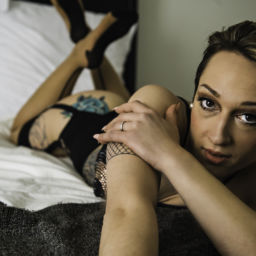
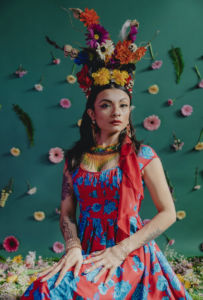
The eve of Zuri Muniz’s passage from girlhood to womanhood was anything but stimulating for her.
She didn’t desire to sport a poofy, ruffled peplum gown in place of her basketball or soccer jersey, even on a day so exciting for most young Latinas.
A framed glamour shot adorns the staircase in the Muniz family household. Smack-dab in the middle of the massive canvas is Zuri — unamused — wearing a quinceañera dress; her tan sports bra screaming for air beneath all the ruching.
On what may have been one of the girliest days of her life, Zuri just wanted to run in the field and get dirty. At least when the celebration ended, she’d tear off the dress and be half ready to go and play.
But her quinceañera was just the beginning. Little did Zuri know that in a few months, she’d no longer be an athlete at Broad Ripple High School, but a crowned beauty queen, learning how to dance cumbias in Ciudad Mante in Tamaulipas, Mexico. This shift would soon augment her cultural ties and values, aiding in the construction of the specific style and personality belonging to the future burlesque belle of Indianapolis: The only and only, Señorita Pussy.
***
Despite being born in Tantoyuquita, a small village in the state of Tamaulipas, Zuri and her family lived in the Brightwood neighborhood of Indianapolis for the majority of her adolescence.
Growing up in the IPS system as a young Latina was isolating for Zuri. The only Hispanic representation she had, Hispanic female representation for that matter, was through her family members, most of which were living hundreds of miles away in states closer to the Mexican border.
“I never had a sister; I had my little brother,” Zuri said. “We have a six-year age gap, and I didn’t really have many Hispanic friends growing up either, so, that was a double-whammy for me.”
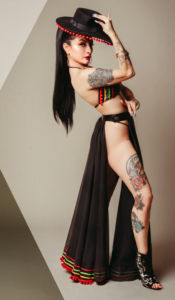
Being a tomboy as a Latina wasn’t necessarily what set off the alarm in Zuri’s parents’ minds about their daughter’s lack of Hispanic characterization. But, because she lacked a foundation of strong Latinas to look up to and hadn’t had any true lived experiences in Mexico, Zuri’s parents decided to send her back to Tantoyuquita at age 16.
Right off the bat, in an attempt to integrate Zuri into Hispanic culture and community, she arrived in Tantoyuquita unaware that a full itinerary was already lined up for her. Zuri’s parents and locals from the village had plans for her to learn how to dance like Celia Cruz, show off her English repertoire on Spanish-speaking podcasts, perform in the town’s “carnavalada,” and even compete in a beauty pageant with 40-year-old women.
Zuri’s biology teacher, Benita, was the first person to push Zuri to seize every opportunity in Tantoyuquita that would help her soak in Hispanic culture. Though confident and unfazed, villagers degraded Benita because her looks contradicted the typical science teacher. Zuri saw Benita embrace her haters and stay suave above it all. Even the way Benita walked inspired Zuri — the void that was a candid depiction of an assertive Latina was finally being filled.
“Benita was hard as nails and she was a bad bitch,” Zuri said. “Big hoops, mini skirt, tights, heels or wedges, and she would just put me in random shit — she taught me poise, speech, and confidence.”
Because Benita signed her up for the carnavalada, Zuri did eventually learn how to dance cumbias like Celia Cruz. There wasn’t much LGBTQ+ inclusivity in Mexico at the time, but Zuri was introduced to her new dance instructor, Philpe, Tantoyuquita’s sole gay man (that they knew of) who’d make her “vogue” until the sun set. From both Benita and Philpe, Zuri learned the importance of sexual and societal diversity, and she would soon advocate for this medley.
Zuri and her classmates practiced day and night for the carnavalada, whether that meant dancing on basketball courts, backyards, or in the middle of the desert. Even in a place so low-resourced, people seemed to make do with what they had in Mexico — a notion which became increasingly clear to Zuri as her time in the village passed.
The cultural authenticity Zuri experienced in Tantoyuquita couldn’t be attained in her corner of the Midwest. On the night of the carnavalada, everything Zuri had soaked up until that point materialized when she stormed the towns’ main street in a headdress and full mambo costume, dancing the group number Philpe had taught everyone.
Benita and Zuri’s parents didn’t stop with the carnavalada and cumbias; they put Zuri in a Mexican beauty pageant, too. Despite her tomboy persona at the time, Zuri chose to participate to learn more about her heritage. She’d never been in something so glamorous before, and it sounded fun to her, but she quickly realized that this pageant was life or death for other contestants.
Some girls were extremely competitive and came from big bucks. Some had mothers that owned high-end boutiques — waiting years to see their daughters walk the runway in costly displays of fluff and glitter. Zuri was just simply in the right place at the right time.
“I was just the one that happened to know English,” Zuri said. “Just that girl living in the last house on the left in the village somewhere … where I’m hunting frogs and riding horses bareback.”
When pageant day arrived, Zuri impressed the judges with her English skills — strutting in her American dress from Express. She stayed true to who she was and won second place. The other two girls on the podium were daughters of those boutique owners — standing next to Zuri, dumbfounded.
Zuri came to Tantoyuquita as a tomboy but left with a newfound identity and sense of her motherland. Now, with an enriched awareness of Latin culture, her Hispanic and American ties would soon merge, creating the woman she is today.
“The carnavalada and beauty pageant really did shape me,” Zuri said. “Having those outlets really opened my eyes to what it is like to have human connection when it comes to big groups … when it comes to community, women, or making things possible.”
***
Right before Zuri’s final semester of her senior year of high school in Tantoyuquita, the Mexican cartel began to pose bigger threats than before. Living in the heart of it all, Zuri went into survival mode. She hopped on a plane for the first time in her life and flew back to America.
Zuri finished her senior year at Ben Davis High School, then rushed into higher education.
“Being in Mexico for two years kind of set me back for the preparation that I needed for college,” Zuri said. “I took 19 credit hours my first semester, not knowing what I was doing.”
Not long after enrollment, Zuri got hit with the dreaded freshman flu. She fell extremely ill and flunked all her classes. With no school, she found refuge at a local Jimmy John’s, baking bread until 4 a.m.
Jumping from country to country, from American to Hispanic education, and then back to America again — all in the span of four years — was like living through multiple culture shocks all at once.
In Mexico, Zuri curated a new identity for herself that she understood. Now, without any clear path, she felt lost again. She never stopped hustling to make her life make sense again. From working in retail to the food industry to corporate America, Zuri was surviving, but not in the way she wanted. However, every new job and paycheck served as an additional building block needed to reach her full potential.
“It’s a lot of self-patience and not letting go of who you are,” Zuri said. “Don’t let anyone dim your shine and just keep that to you because if you don’t, you can’t evolve.”
While managing Journeys at Castleton Square Mall in 2013, amid her personal hustle and professional development, Zuri went to her first burlesque show when she turned 21. Unbeknownst to her at the time, this was the place that would become her home, her college, her safe haven: the White Rabbit Cabaret.
Though she had to squint between bodies in the very back of the club, Zuri’s sight was entirely fixated. She was enthralled with everything happening on stage — the Columbian music, the bold eyeliner, corsets made from fringe and sequins, drag queens dancing — all of it. The show reminded her of her time in Tantoyuquita, of Benita and Philpe … of the identity she had once found.
It was then that the burlesque flame was ignited in Zuri’s mind. It was also then that she found out she was pregnant.
After nine months of working at Buffalo Wild Wings, biding time before her baby boy’s arrival, Zuri gave birth in 2014. She spent the following two years blossoming as a devoted mother with a child on the autism spectrum. As she settled into motherhood and became confident in her body again, those burlesque aspirations began to resurface.
Time and time again, Zuri gravitated back to the White Rabbit for shows. The visits continued not because she relished in being a spectator, but because she was living vicariously through the performers; she desired to be the one on stage.
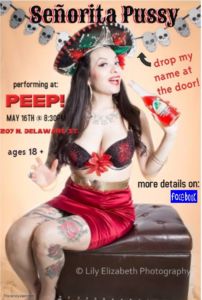
In April 2016, local burlesque personalities Bunny VanDoren and Pepper Mills hosted a competition-based, open-stage opportunity at Crackers Comedy Club. In order for Zuri to compete, she needed to be name-dropped by fans at the door. The one name with the most mentions would receive the opportunity, along with a $50 guarantee.
Without any prior entertainment experience, Zuri wondered if burlesque could be a hobby or her full-time gig. Either way, how would she make this possible?
Instantly, that tomboy in the beauty pageant flashed in her eyes. Zuri saw the girl who once learned a Shakira dance number just because Benita told her she could, and at once, Benita’s ethos and snapshots of what she had seen in Tantoyuquita coursed through her brain — kindling her drive.
“I felt like a fish out of water in my own country,” Zuri said. “My self-confidence and challenge roots come from Benita; she taught me if there’s an opportunity that comes, you take it.”
Zuri knew this was her chance to fill the slot. She asked one of her best friends, Lily, to photograph her as a Mexican pin-up doll in an outfit she crafted from random Goodwill pieces. Zuri took those photos and started building her own brand on the internet; putting her stage name, the show information, and instructions on how to name-drop her on the advertisements.
Zuri rounded up enough support from Indy locals and received not one, but two open-stage opportunities. Zuri’s brand strategy quickly escalated and evolved; people became enthralled by her. Five months later, Zuri was recruited by the burlesque troupe of Indianapolis — the Rocket Doll Revue. Soon after, “Señorita Pussy” was born.
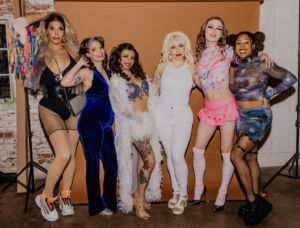
While preparing for a burlesque festival with her fellow Rocket Dolls, Zuri attended a workshop led by Bella Blue, a performer from Louisiana who happened to be a mom, like Zuri.
“The class was called ‘Pussy Magic,’” Zuri said. “There’s this whole practice that she gives; it’s all about your core power: take deep breaths, superwoman stance, align yourself, and it’s all right there in your abdomen — it’s Pussy Magic.”
As a novice and the only Rocket Doll mom, Bella squashed Zuri’s imposter syndrome. Zuri could perform, and Bella showed her that she can and will look powerful and beautiful while doing it.
Zuri stayed with the Rocket Dolls for the better part of “Señorita Pussy’s” existence. She’s performed in wrestling shows with Bizarro Lucha and has made a name for herself at various breweries across Indianapolis. She has bookers waiting for her in Seattle, Portland, and Cleveland to see her “Pussy Magic.”
“I don’t see any other Latina in this town doing what I’m doing,” Zuri said. “They’ve seen what I’ve done and the attention I got. I’m like, ‘Oh shit, I’m out here doing it.’ I’ll see myself in a music video and I’m like, ‘Oh, yeah, I forgot I did that.’”
Last year, Zuri decided to work independently. Balancing burlesque, single parenting, a job at BODHI, and being a certified medical interpreter was enough for her to venture into a new phase of life. She’s built her brand, and now she’s striving to reinvent and diversify Indy’s burlesque scene with her resources.
“The toughest part is the culture and language barrier because you don’t really see that representation,” Zuri said. “I can’t let this country soak up my culture — that’s where my passion lies. I keep that close to my heart.”
For example, when Zuri facilitates a bingo act, she makes the community read back their cards in Spanish to claim the bingo. She’s brought in multiple Hispanic performers to the White Rabbit and people often tell her they want to learn Spanish because of what they’ve seen her do.
The grind has truly never ended for Zuri — every day is a double shift — but she wouldn’t want it any other way. Still driving the same car that she bought with her FAFSA money, Zuri stays humble, only competing against who she was yesterday.
She may not receive every opportunity, but having her son see that hustle, her innate determination, is the best payoff Zuri could ever receive.
“Every mom is going to have her struggles, but at the end of the day, she’s not going to give up,” Zuri said. “That is NOT an option. You don’t give up. All of this hard work — it is going to be worth it.”
Mina Denny was Indy Maven’s editorial intern. You can connect with her on Twitter and on LinkedIn.
All of our content—including this article—is completely free. However, we’d love it if you would please consider supporting our journalism with an Indy Maven membership.







